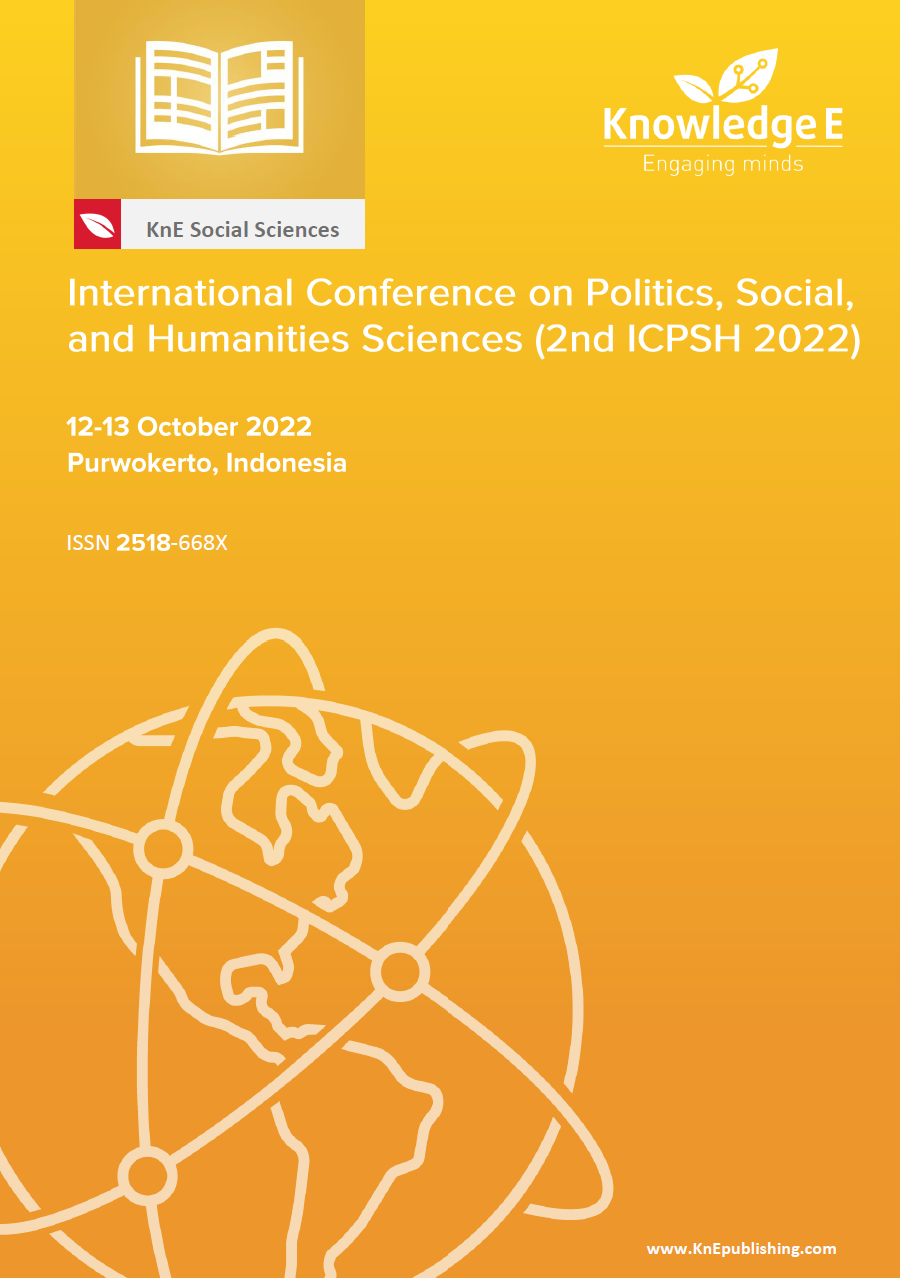Analysis of How Local Online News Helped Shape Waste Management Policies in the Aftermath of the COVID-19 Pandemic
DOI:
https://doi.org/10.18502/kss.v8i3.12817Abstract
The purpose of this study was to provide an overview of the role played by local online news in improving policies on waste management in the aftermath of the COVID-19 pandemic. This subject is worth examining since online news, as one of the pillars of democracy, must be able to present its strategic roles on issues of public concern at all levels. This research was conducted using the content analysis method. The study found that Radar Banyumas, a local online news media based in Banyumas Regency, published 28 news articles related to waste issues during the study period, which can be categorized into three major groups: policy articles, social criticism articles, and best practice articles. The study shows that Radar Banyumas is able to play an ideal role in influencing public policy agenda, overseeing policy implementation, providing education to the public, and providing solutions to waste problems. Radar Banyumas has acted as an ideal medium to help shape waste management policies at the regional level.
Keywords: waste, local online news media, social criticism, policy recovery
References
SIPSN. Capaian Kinerja Pengelolaan Sampah [Internet]. Sistem Informasi Pengelolaan Sampah Nasional (SIPSN). 2022 [cited 2022 Jul 21]. Available from: https://sipsn.menlhk.go.id/sipsn/
Liputan6.com. Indonesia Produksi Limbah Plastik 66 Juta Ton per Tahun, Apa Solusinya? Liputan6.com [Internet]. 2021; Available from: https://www.liputan6.com/bisnis/read/4706371/indonesia-produksi-limbah-plastik- 66-juta-ton-per-tahun-apa-solusinya
Masduki. Kebebasan Pers dan Kode Etik Jurnalistik. Yogyakarta: UII Press; 2004.
Halik A. Atmosfer kebebasan pers. J Jurnalisa. 2020;6(1):140–59.
Bognár B. A culture of resistance: Mass media and its social perception in central and Eastern Europe. Polish Sociol Rev. 2018;202(2):225–42.
Kirdemir B. TURKEY ’ S DIGITAL NEWS LANDSCAPE Polarization , Social Media , And Emerging Trends Baris Kirdemir | EDAM Non Resident Fellow. 2020;(2020).
Morgan J. Changing the conversation. Lancet Diabetes Endocrinol. 2018;6(6):444.
Schroeder R. Media systems, digital media and politics. Soc Theory after Internet. 2018;28–59.
McHale JP. Mass Media, Social Control, and Political Authority in a Post-Truth Environment. In: Rabe-Hemp CE, Lind NS, editors. Political Authority, Social Control and Public Policy [Internet]. Emerald Publishing Limited; 2019. p. 259–73. (Public Policy and Governance; vol. 31). Available from: https://doi.org/10.1108/S2053- 769720190000031017
Liu S, Cai L, Zhao X. The role of mass media in education policies: a Chinese case study. J High Educ Policy Manag. 2019;41(2):186–203.
Feezell JT. Agenda Setting through Social Media: The Importance of Incidental News Exposure and Social Filtering in the Digital Era. Polit Res Q. 2018;71(2):482–94.
Amoako S, Opoku MP, Nketsia W, Edusei AK, Afriyie SA, Badu E. Inclusivity in neo-liberal policy environment: preparedness of mass media to support disability awareness campaigns in Ghana. Disabil Rehabil [Internet]. 2020;42(21):3015–23. Available from: https://doi.org/10.1080/09638288.2019.1582718
Bhaskar K, Kumar B. Electronic waste management and sustainable development goals: Is there a business case for linking the two? J Indian Bus Res. 2019;11(2):120– 37.
Chung IJ. Dynamics of media hype: From Media Hype to Twitter Storm. 2018;211–28.
Pinho M, Dias Costa E. Can mass media be an obstacle to rationing decisions? A case report from Portugal. Int J Heal Gov [Internet]. 2020 Jan 1;25(1):3–11. Available from: https://doi.org/10.1108/IJHG-10-2019-0069
Andrianti N. Peran Media Massa Nasional Dalam Politik Internasional. Informasi. 2015;45(1):43.
Kuckartz U. Qualitative Text Analysis: A Systematic Approach [Internet]. Springer International Publishing; 2019. 181–197 p. Available from: http://dx.doi.org/10.1007/978-3-030-15636-7_8
Shava GN, Hleza S, Tlou F, Shonhiwa S, Mathonsi E. Qualitative Content Analysis, Utility, Usability, and Processes in Educational Research. Int J Res Innov Soc Sci [Internet]. 2021;V(VII):2454–6186. Available from: www.rsisinternational.org
Soroka S, Wlezien C. Tracking the Coverage of Public Policy in Mass Media. Policy Stud J. 2019;47(2):471–91.
Suwirta A. Pers dan Kritik Sosial pada Masa Orde Baru: Studi Kasus Pers Mingguan Mahasiswa Indonesia di Bandung, 1966-1974. Mimb Pendidik. 2018;3(2):113–36.
Suwirta A. Pers dan Kritik Sosial pada Masa Orde Baru : Peristiwa MALARI Tahun 1974 dalam Pandangan Surat Kabar Merdeka dan Indonesia Raya di Jakarta. Susurgalur J Kaji Sej Pendidik Sej. 2018;6(1):73–98.
Suwirta A. Pers dan Kritik Sosial pada Masa Orde Baru : Kasus BAPINDO Tahun 1994 dalam Sorotan Surat Kabar Republika di Jakarta. Insa J Islam Stud Indones Southeast Asia. 2018;3(1):161–86.
Rosenlund J, Nyblom Å, Matschke Ekholm H, Sörme L. The emergence of food waste as an issue in Swedish retail. Br Food J [Internet]. 2020 Jan 1;122(11):3283–96. Available from: https://doi.org/10.1108/BFJ-03-2020-0181
Aktas E, Sahin H, Topaloglu Z, Oledinma A, Huda AKS, Irani Z, et al. A consumer behavioural approach to food waste. J Enterp Inf Manag. 2018;31(5):658–73.
SIPSN. Komposisi Sampah Berdasarkan Jenis Sampah [Internet]. Sistem Informasi Pengelolaan Sampah Nasional (SIPSN). 2022 [cited 2022 Jul 21]. Available from: https://sipsn.menlhk.go.id/sipsn/
SIPSN. Komposisi Sampah Berdasarkan Sumber Sampah [Internet]. Sistem Informasi Pengelolaan Sampah Nasional. 2022 [cited 2022 Jul 21]. Available from: https://sipsn.menlhk.go.id/sipsn/
Chen B, Lee J. Household waste separation intention and the importance of public policy. Int Trade, Polit Dev. 2020;4(1):61–79.
Thanh PT, Tung LT. Can risk communication in mass media improve compliance behavior in the COVID-19 pandemic? Evidence from Vietnam. Int J Sociol Soc Policy. 2021.
Schauseil W, Zúñiga N, Jackson D. Media and anti-corruption. 2019;0–18.
Litschka M. The political economy of media capabilities: The capability approach in media policy. J Inf Policy. 2019;9:63–94.
Jensen C, Wenzelburger G. Welfare state reforms and mass media attention: Evidence from three European democracies. Eur J Polit Res. 2021;60(4):914–33.
Chang W-C. Media use, political trust and attitude toward direct democracy: empirical evidence from Taiwan. Online Inf Rev [Internet]. 2022 Jan 1;46(4):733–53. Available from: https://doi.org/10.1108/OIR-09-2019-0290
Katikireddi SV, Hilton S. How did policy actors use mass media to influence the Scottish alcohol minimum unit pricing debate? Comparative analysis of newspapers, evidence submissions and interviews. Drugs Educ Prev Policy. 2015;22(2):125–34.

